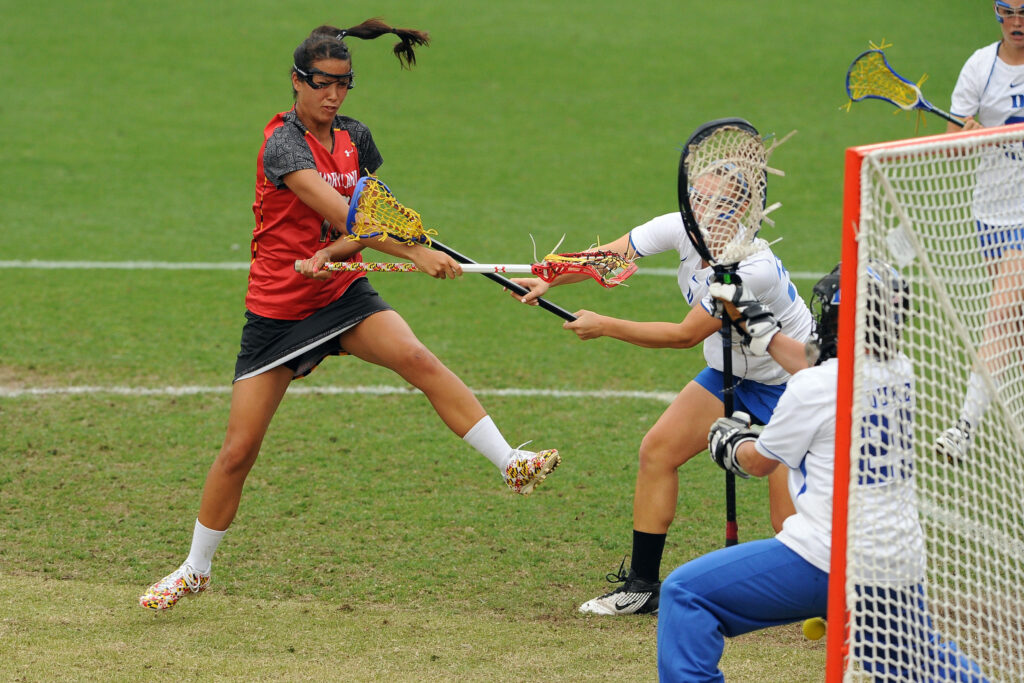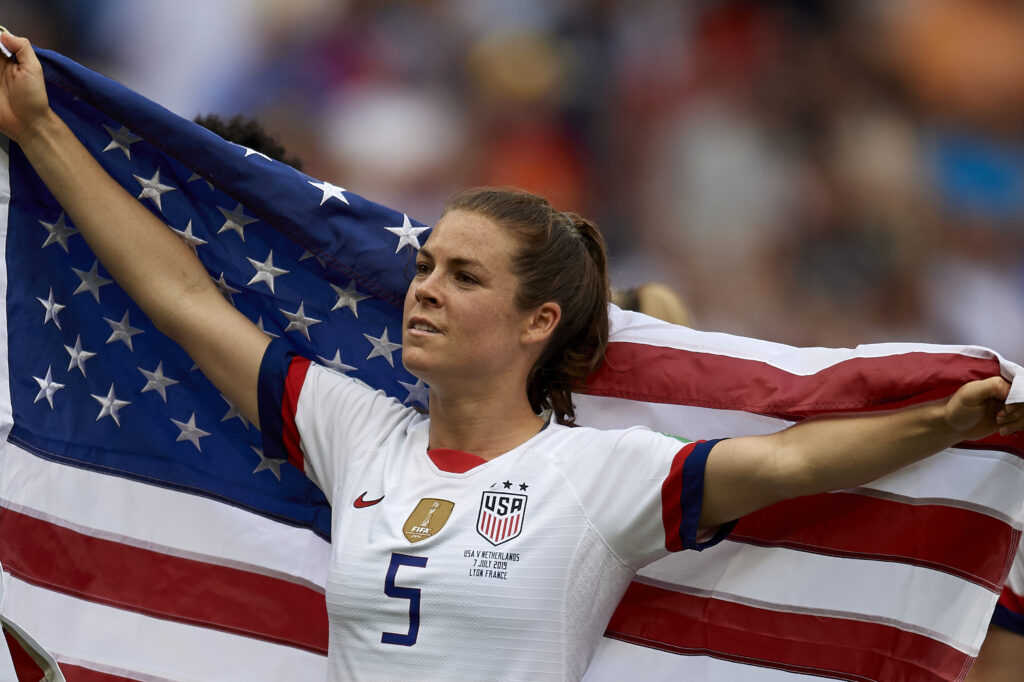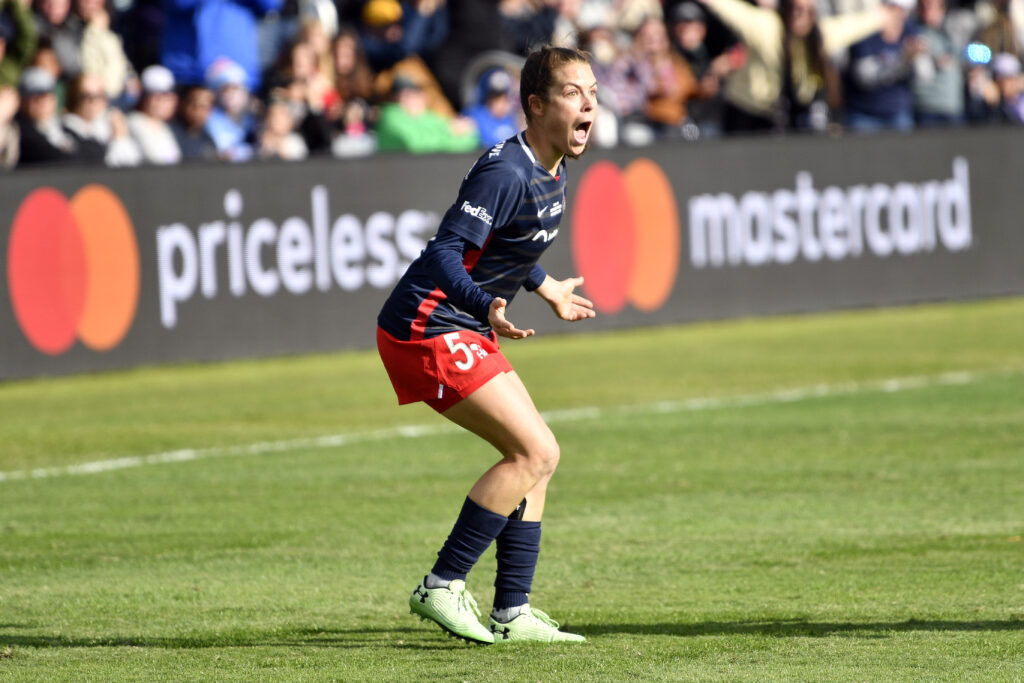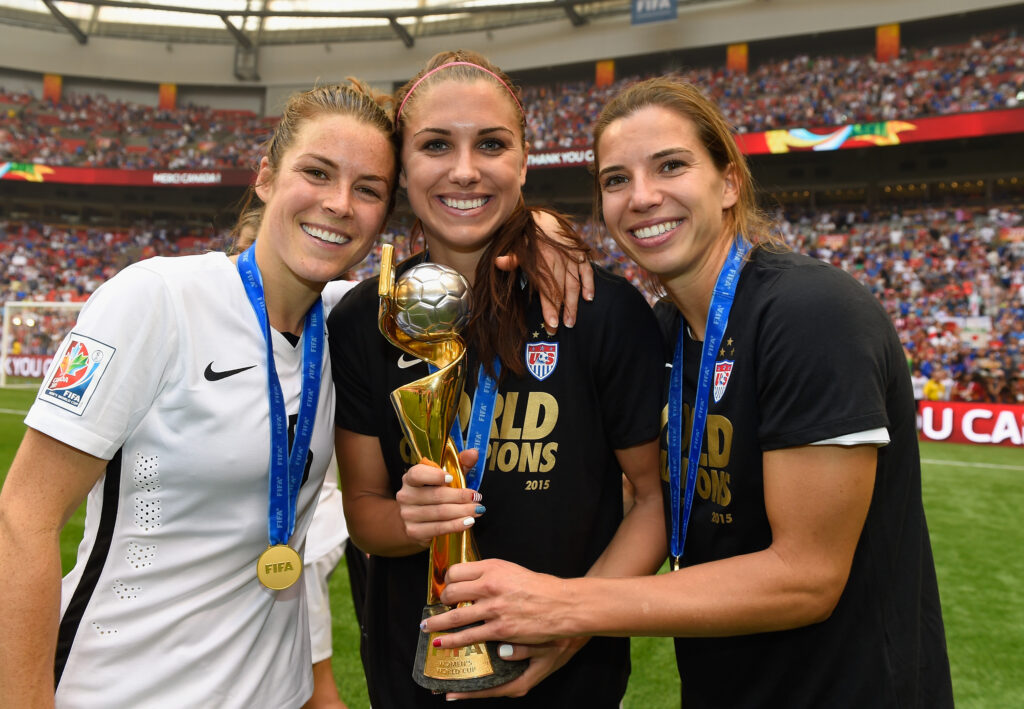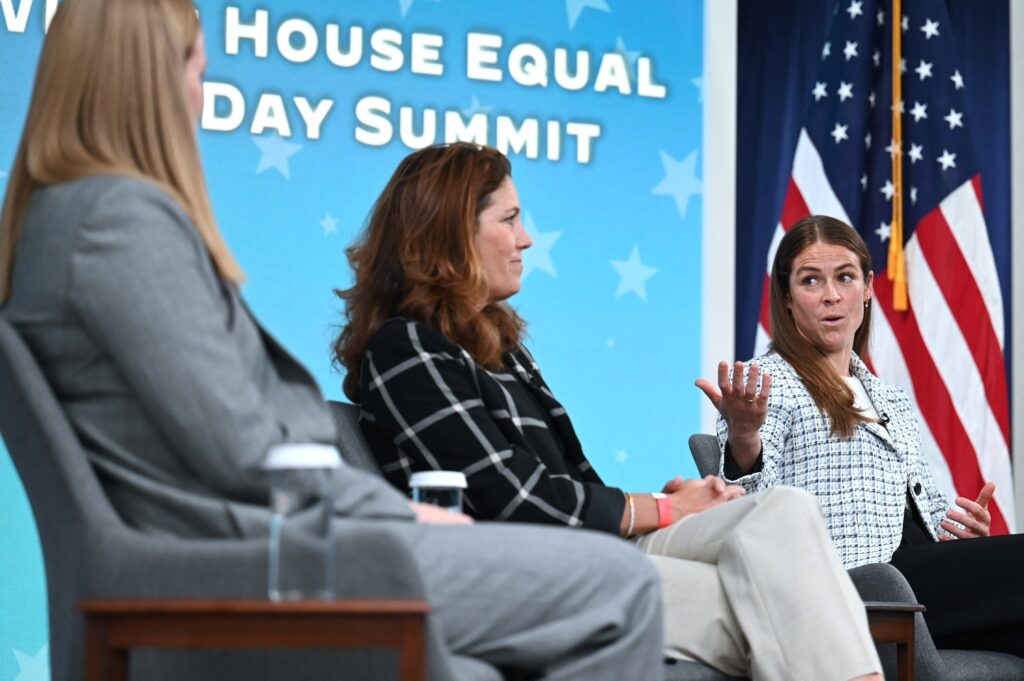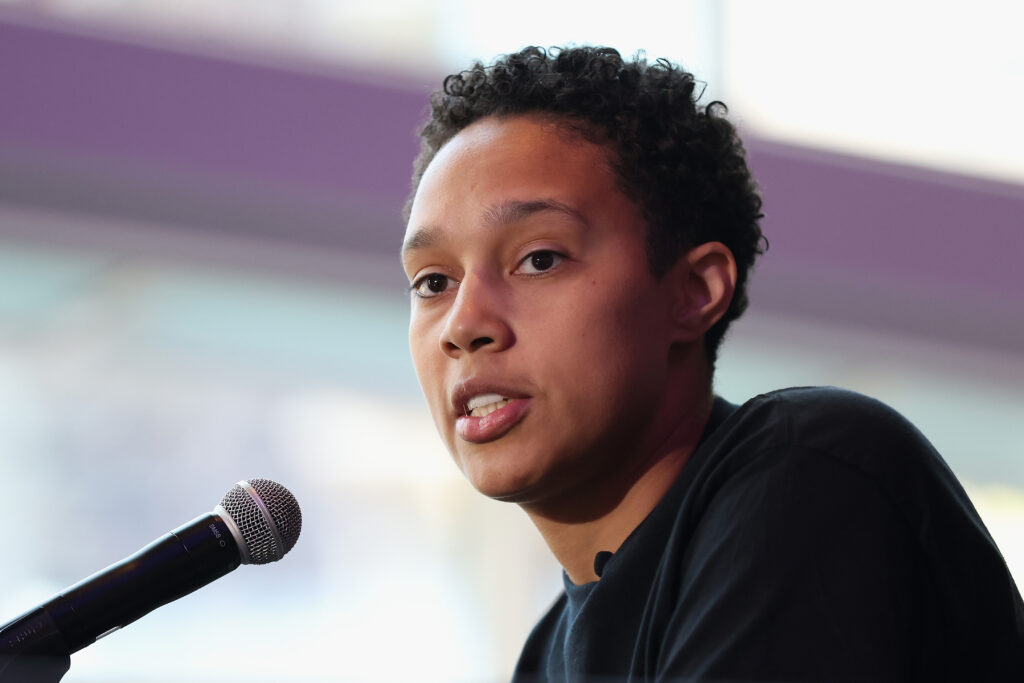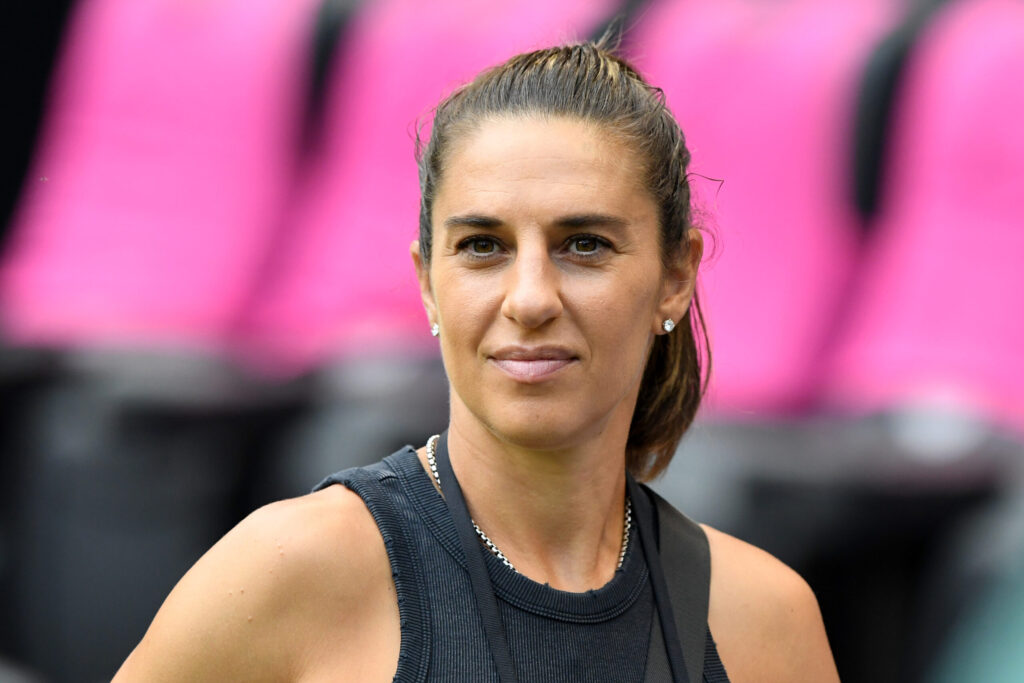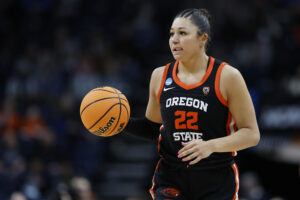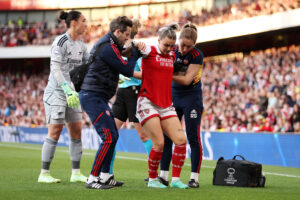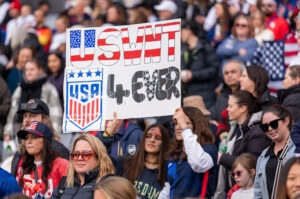You had an awesome career at Maryland. What initially drew you to the school?
Maryland wasn’t even my dream school at first. It was actually the last school I visited. When I was going through the recruiting process my dad made me visit all of the schools that were looking at me so I went to about 25 different schools. And I thought the campus was all right, didn’t think anything was crazy awesome about it. But it checked all my boxes: big school, big sports team, big campus. It was when I met the team and Cathy, our head coach, that I realized I had to go there. I just fell in love with the culture.
What was it like winning a championship your freshman year?
It was pretty unreal. It was my dream. I mean, it’s every little kid’s dream, and it’s even better than you expect it to be. Winning it my freshman year, I was like, “Oh, that was easy. I guess we’re going to do it every year now.” But unfortunately we didn’t win again. My freshman year it was all based on our seniors and their leadership. They were just absolutely incredible. That first year really paved the way for me and showed me how I wanted to be treated and how I wanted to treat others.
Although your team didn’t win another championship the last three years of your career, you came really close.
We always made it really, really close. I mean, I played in the national championship game again my sophomore and senior year. And as a senior we ended up losing the championship game in triple overtime. Although it was super hard to lose, I learned so much every single year from losing in the national championship or in the final four. I know for a fact that I am the person I am because of my experience at Maryland under Cathy, and I’m not sure that winning more championships would have changed that. Of course, it would have been icing on the cake.
Losing in triple overtime your senior year must have left you feeling like you still had some unfinished business.
Oh my God, 100%. After I graduated, I actually stayed and worked at the university under Cathy purely because I was like, “I am not done. I can’t be done.” I couldn’t understand why it had all happened the way it had because I felt like our senior class did everything right. We were the leaders we wanted to be. I kept thinking “Why didn’t the good guys win?” Ultimately, I think it all made me a better coach. And then, after that it really pushed me into fighting to make the 2017 World Cup team because I was like, “I’m not ready to be done with lacrosse.” So it had some positive effects.
What does it mean to you to be a professional lacrosse player for the WPLL? What’s your big picture vision for the league?
Considering myself a professional athlete is something that I would have never thought was possible, and I’m so grateful that I live in a time where I can really lay the foundation and be a part of paving the way to make lacrosse a powerhouse sport at the professional level. I want lacrosse, men and women, to be where basketball is, where baseball is, where football is. I want females and males in the sport that I love to be able to have this be their full time job. And I think that what it’s going to take to get there is just exposure.
I think that that’s really what the PLL [Premier Lacrosse League] did a great job at doing, especially getting their NBC Sports deal. Their social media coverage of last summer was absolutely out of this world. It was showing people lacrosse like they’d never seen it before. And I think that women’s lacrosse has to do the same thing. We need to have the same innovation and exposure that they had. We don’t have to change the sport. We have the people. All the women involved are incredible. They’re so well-rounded and they know what it takes to scrape and claw at being a professional athlete. We all empower each other. Now we just have to bring the social media and the marketing and the TV exposure to our sport. We have to put these female athletes on a platform so that the most number of people can see them and know what great role models they are for the next generation.
You yourself have quite the social presence. You’ve honestly blown up! How did that come about?
I think that it just came really natural, and it also is something that I just genuinely enjoy. I’m an oversharer, I love connecting with people, and I think social media, when used positively, is just so powerful because it can connect you with so many people from all over the world.
We’re lucky at Maryland because we have so many youth programs that come and watch us and because we’re in such a hotbed for the sport. Cathy also does such a good job in encouraging us to be role models. That’s where I found my love for coaching, by connecting with players at camps and coaching them when I was still playing at Maryland. I think that created a little bit of a fan base, and then those people have just grown up with me, which is really cool.
How do you view the interplay between your athletic career and your personal brand?
I think it actually goes hand-in-hand with lacrosse as a sport, in terms of being creative. There’s room for creativity in the shots you take and just the way that the game is changing, and growing, and moving fast. It’s the same with social media. And I think that’s why anything goes, because it’s a space that’s constantly changing and growing. And it’s so accessible to everyone, so why not share my experiences? I’ve been running weekly workouts and I’ve had 300 people join my live workouts. I’ve never worked out with 300 people in my life so it’s been cool.
Inevitably, there’s going to be trolls. How do you deal with them?
Trust me, there’s plenty of those negative keyboard warriors out there. But my mentality is, if I connect with just one person, if one person can read or watch my posts and get some insight into what I’ve gone through, and if that helps them in turn, then it’s worth it. Now, I might not be everyone’s cup of tea. I might not relate to every single person. But I love what I’m doing, and so I’ll continue to keep growing. It really is genuinely what I am creating at the moment.
Do you think your playing style has changed from college to the professional level?
In college, your game develops as you grow as a team and as an individual. And you have the luxury of playing together with teammates every single day. Whereas now, at the professional level, we do not have very much time to get ourselves together with our teammates. In college I was more of an assister but now I am more of a goal scorer. With the US Team, I just slotted into that role just because we had ridiculous ball handlers on our team and I just wanted to get onto that team in any way, shape, or form that I could, and if that took me being a catch and finisher, then I was okay with that. That’s how my game has evolved. I’ve learned what works for me and what doesn’t. And I just think with being a little bit on the older side, especially in the pro league, it saves a lot to not be the one with the ball going to goal every single time.
How do you think lacrosse’s growth compares to other female sports professionally and internationally? Obviously, there’s been a ton of talk about pushing for the sport to be in the Olympics. How does it get there?
Lacrosse is both the fastest growing sport and the fastest game on two feet. So for any young athlete that wants to run really fast and play a sport that’s high-scoring, lacrosse is the one for you. I think it’s just such a perfect combination of so many things we love. It has the same one-on-one play as basketball. You have to have the same hand-eye coordination as in field hockey, but it’s on a soccer field. You shoot into a goal and it has contact like hockey. It combines so many sports that if you’re an athlete you are going to pick it up quickly, and then if you really love it you’re going to excel. And I think the best part about it is that it’s just so quickly growing that I tell all my club girls, if you want to play lacrosse in college, there is a spot for you. There’s so many college programs that are looking for people to fill their roster.
And playing professionally now is really cool, as is playing internationally for the World Cup. But I think getting this game into the Olympics is the most vital thing. There’s about 27 women’s teams that compete at the World Cup, and 40 on the men’s side. So there’s an international love for the sport, but I think that we need to make it more feasible for those who may not have the budgets to play. Ultimately, they are shooting for lacrosse to be in the Olympics by 2028. And in order to do that, they’ll have to go with this new Olympic format, where it’s six on six on a smaller field and there’s no draw after goals.
What are your own personal goals in the sport? Do you see yourself playing for many more years?
I want to play for as long as I can. I don’t think I could ever see being without lacrosse in my life, but I have also developed a love for fitness and lifestyle and mindfulness coaching. So I could see myself, especially as I continue to grow my brand, just helping these young female athletes navigate the craziness of growing up. Being a female athlete is so unique. I think it’s your superpower. But it’s like, how are you going to be the best at your sport, be a complete bad-ass, but also not be catty, and not be jealous, and not be insecure but be self-confident? There’s so much to navigate that I wish I would have had a strong female role model help me go through it. Now I hope to be that for someone one day.
I think that I will always work with people in some sort of regard, through leadership, through coaching, through fitness. And I just think growing my brand to help those middle school, high school girls that are just going through sport and looking for a good role model is my ultimate goal.
